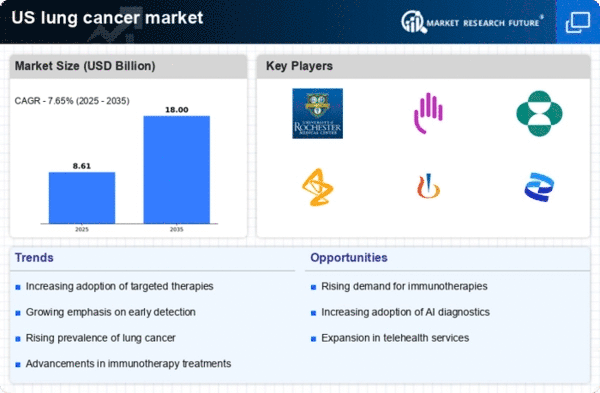Growing Incidence of Lung Cancer
The increasing incidence of lung cancer in the US is a primary driver for the lung cancer market. According to the American Cancer Society, lung cancer remains the leading cause of cancer-related deaths, accounting for approximately 25% of all cancer fatalities. This alarming statistic underscores the urgent need for effective treatment options and early detection methods. As the population ages and risk factors such as smoking persist, the demand for innovative therapies and diagnostic tools is likely to rise. The lung cancer market is expected to expand significantly, with projections indicating a compound annual growth rate (CAGR) of around 10% over the next several years. This growth reflects the healthcare industry's response to the pressing need for improved patient outcomes and survival rates.
Technological Advancements in Diagnostics
Technological advancements in diagnostic tools are transforming the lung cancer market. Innovations such as liquid biopsies and advanced imaging techniques enable earlier and more accurate detection of lung cancer. These technologies facilitate the identification of biomarkers, which can guide personalized treatment strategies. The integration of artificial intelligence in radiology is also enhancing the precision of lung cancer diagnosis. As a result, healthcare providers are increasingly adopting these advanced diagnostic methods, leading to improved patient management and outcomes. The lung cancer market is likely to benefit from this trend, as the demand for cutting-edge diagnostic solutions continues to grow. The market for diagnostic tools is projected to reach approximately $5 billion by 2027, reflecting the critical role of technology in addressing lung cancer.
Rising Awareness and Education Initiatives
Rising awareness and education initiatives regarding lung cancer are influencing the lung cancer market. Public health campaigns aimed at educating the population about the risks associated with smoking and the importance of early detection are gaining traction. Organizations such as the American Lung Association are actively promoting lung cancer screening programs, which have been shown to reduce mortality rates. As awareness increases, more individuals are likely to seek screening and treatment, thereby driving demand in the lung cancer market. This trend is expected to contribute to a growth rate of approximately 8% in the market over the next few years, as more patients are diagnosed and treated at earlier stages of the disease.
Regulatory Support for Innovative Therapies
Regulatory support for innovative therapies is a crucial driver of the lung cancer market. The US Food and Drug Administration (FDA) has implemented expedited approval pathways for breakthrough therapies, allowing for faster access to new treatments. This regulatory environment encourages pharmaceutical companies to invest in the development of novel lung cancer therapies. The FDA's recent approvals of targeted therapies and immunotherapies have demonstrated a commitment to addressing unmet medical needs in lung cancer treatment. As a result, the lung cancer market is likely to experience accelerated growth, with an increasing number of therapies entering the market. This trend not only enhances treatment options for patients but also stimulates competition among manufacturers, potentially leading to more affordable solutions.
Increased Investment in Research and Development
Increased investment in research and development (R&D) is a significant driver of the lung cancer market. Pharmaceutical companies and biotech firms are allocating substantial resources to discover and develop novel therapies. This trend is fueled by the recognition of lung cancer's complexity and the need for targeted treatments. The National Cancer Institute reports that funding for lung cancer research has seen a steady increase, with federal funding exceeding $300 million annually. This financial commitment is likely to accelerate the development of innovative therapies, including targeted agents and immunotherapies. As new treatments emerge, the lung cancer market is expected to expand, providing patients with more options and potentially improving survival rates.
















